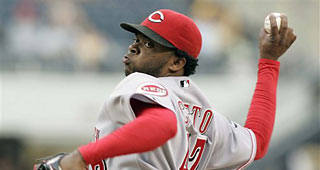The first round of divisional series begins on Saturday with the Tigers-Athletics and Giants-Reds taking the field in Detroit and San Francisco, respectively.
Meanwhile, the Yankees and Nationals await the winners of Friday's Wild Card games.
The new contrived schedule has the higher seed traveling for the first two games of the series, a wrinkle that like the addition of a second Wild Card has drawn varied opinions. It gives the lower seed a chance to grab an early advantage, while the most meaningful games will all be played at the home of the better club. No team wants to fall into a 0-2 hole, especially after working all season for "home-field advantage," but hosting all potential elimination games is a definite plus.
Athletics vs. Tigers
I lovingly refer to this as the "Paper Series" because simply looking at these teams on paper is a huge mistake. The Tigers clearly look better and much more dangerous, but the Athletics didn't charge late to overtake the Rangers in the American League West on luck alone.
Oakland had the sixth-best pitching staff in baseball this season (3.48 ERA) and the second-lowest ERA in the AL. Opposing hitters had a .245 batting average against A's pitchers and they trusted a very steady defense. Detroit's ERA was a tad higher (3.75) as was their BAA (.256), but they averaged 1.1 more strikeouts per game.
The Tigers may have a game-changing one-two punch in Miguel Cabrera and Prince Fielder, but they only scored 13 more runs than the starless A's, good for just an .08 run advantage per game. Here's a stat that might surprise you: Even with Cabrera and Fielder, the Tigers had 32 fewer home runs than the A's (163 to 195). Want another number that might surprise you? The once uber-patient Athletics had an on-base percentage of .310 (against .335 for the Tigers). Detroit's edge in OPS over the 162-game season was vast (.757 to .714).
When it boils down to it, the Tigers will have to cross their fingers that Cabrera and Fielder come to bat in key late-game situations, while the Athletics have five players that hit more than 15 home runs and not a single hitter than will make-or-break their offense with a bad game.
Oakland's approach at the plate may have changed over the last decade-plus, but they are still built largely on pitching. Jarrod Parker and Tommy Milone are their workhorses, but their opposition enters October with more experience and better equipment to foil hitters.
The Tigers tied with the Yankees for the third-most strikeouts in the Major Leagues this season, which bodes well against the aggressive hitters that Bob Melvin employs. Justin Verlander and Co. should look to attack hitters early in hopes of not only strikeouts, but poorly hit balls.
Oakland would increase their chances of advancing by showing a little patience at the plate, surprising Detroit in the process, but at this point you shouldn't alter what got you to the dance. They have also been a better offensive team since the All-Star break, scoring more runs in the second half than all but three teams.
Ultimately, a five-game series favors the team with more star-power and the Tigers have it in spades. They'll be able to send Verlander out twice with ease and they have the first Triple Crown winner since the 1960s anchoring their offense.
Prediction: Tigers In 5
Reds vs. Giants
The knock on the Giants in the post-Bonds era has been that they don't score enough runs to support an excellent pitching staff, but they had an above-average offense this season. Only four National League clubs (Brewers, Rockies, Diamondbacks and Nationals) scored more runs than the Giants this season and only one (Washington) is in the playoffs.
The Reds, meanwhile, posted a slightly higher OPS (.726 to .724) and clubbed 69 more home runs than the Giants. San Francisco wants to play small ball, while Cincinnati is content to hope for a single and a smash for quick two runs. The Reds feature seven players with at least 14 home runs, while the Giants have just two in double figures in Buster Posey (24) and Pablo Sandoval (12).
The home ballparks figure into those stats to a degree, but the power hitting advantage clearly goes to the Reds.
Cincinnati's edge doesn't end on the offensive side. They had a lower ERA (3.34) than San Francisco (3.68) and generally better command as well. The Giants averaged 2.53 strikeouts per walk this season, lower than the 2.92 K/BB rate the Reds enjoyed. Flame-throwing closer Aroldis Chapman is a big reason why Cincinnati racked up Ks at such a high rate. He rung up 122 batters and walked just 23 in less than 72 innings.
Johnny Cueto, Mat Latos and Homer Bailey are imposing, but the Giants feature a pitching staff led by Matt Cain that can get hot and lead them all the way to the World Series. Pitching should dominate this series with each run scored carrying a great deal of weight. That means timely hitting and strong bullpen performances will dictate who wins the series.
The Reds have more offensive weapons and their bullpen has been historically good in 2012. As long as the starters don't put them in early holes, this is Cincinnati's series to lose.
Prediction: Reds In 4



